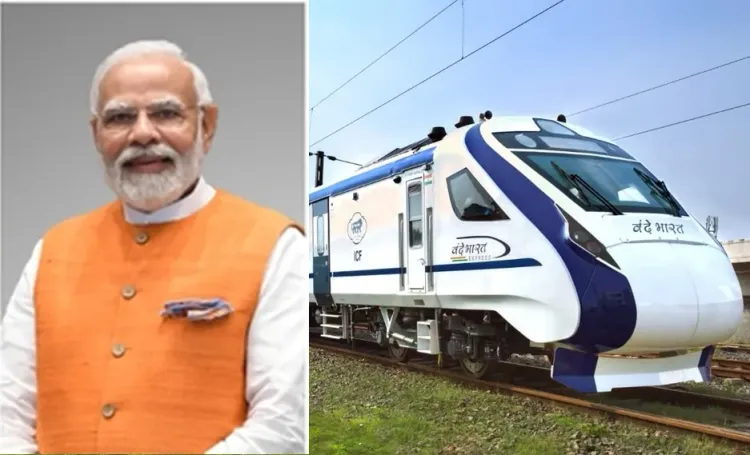PM Modi to Inaugurate Train Service from Katra to Valley on April 19

Synopsis
Key Takeaways
- Inauguration of Katra to Valley train service by PM Modi.
- Train crosses the Pir Panjal mountain range.
- Designed to operate in extreme cold conditions.
- Expected to boost local economy and tourism.
- Completion of major rail projects leading to improved connectivity.
Jammu, March 27 (NationPress) Prime Minister Narendra Modi is set to inaugurate the inaugural train journey from Katra to the Valley on April 19, realizing a dream for over 70 years regarding rail connectivity to Kashmir.
The train will depart from Katra in the Reasi district, traversing the Pir Panjal mountain range to reach Srinagar and its ultimate destination, Baramulla in northern Kashmir.
During the ceremony, PM Modi will be joined by Railway Minister Ashwini Vaishnaw, Union Minister of State Dr Jitendra Singh, Lieutenant Governor of Jammu and Kashmir Manoj Sinha, and Chief Minister Omar Abdullah.
Currently, train services operate from Sangaldan to Baramulla. On the morning of April 19, the Prime Minister is expected to arrive at Udhampur Army airport from New Delhi and then travel to the world’s highest railway bridge over the Chenab river located in Reasi.
He will receive updates on the construction of this bridge, which is hailed as an engineering marvel.
Following this, PM Modi will head to the Mata Vaishno Devi base camp in Katra to flag off the Vande Bharat train to the Valley.
Prior to returning to Delhi, PM Modi is also scheduled to speak at a public rally in Katra.
Railway officials indicated that after the expansion work at Jammu Railway Station is completed, including the addition of more platforms, services to the Valley from Jammu will commence, likely by July-August this year.
“There will be no direct train from Delhi or any other location to Kashmir. Passengers will need to disembark at Katra and change trains. This process will eventually shift to Jammu,” officials elaborated.
Numerous trials of the train from Katra to Baramulla, including the Vande Bharat Express, have been successful, and security concerns have been adequately addressed.
Out of the total 272 kilometers of the Udhampur-Srinagar-Baramulla Rail Link (USBRL) project, 209 kilometers have been commissioned in phases, starting with the first phase of the 118 km Qazigund-Baramulla section in October 2009, followed by the 18 km Banihal-Qazigund link in June 2013, the 25 kilometers of the Udhampur-Katra stretch in July 2014, and the 48.1 km Banihal-Sangaldan section in February of the previous year.
The work on the 46 km Sangaldan-Reasi section was completed in June last year, leaving only a 17 km stretch between Reasi and Katra, which was finalized nearly three months ago. This led to the commencement of various train trials, including that of the Vande Bharat.
Overall, the project incurred an expenditure of Rs 41,000 crore.
A successful trial run of an electric train was conducted on the Katra-Banihal section on January 4.
Multiple trials over recent months on different segments of the track, including the two significant milestones of the Anji Khad and Chenab bridges, have been executed.
The Vande Bharat Express Train linking Katra and Srinagar has been specially constructed with anti-freezing features.
Produced by the Integral Coach Factory (ICF) in Chennai, this new Vande Bharat train can function seamlessly in extremely cold conditions as low as minus 20 degrees Celsius. To ensure passenger and driver comfort, the train is fitted with state-of-the-art heating systems.
Safety features include CCTV cameras and Emergency Talk Back Units. The train is equipped with shatterproof windows, and the driver’s windshield features a specialized anti-frost system that ensures clear visibility.
The train service to Kashmir is anticipated to significantly enhance tourism, horticulture, agriculture, industries, and education, providing relief to the average Kashmiri, who can now put aside concerns about the strategic Jammu-Srinagar highway being obstructed due to rain and snow.
Moreover, the train will facilitate uninterrupted all-weather connectivity, significantly reducing the cost of transporting goods to and from the Valley in the near future.










